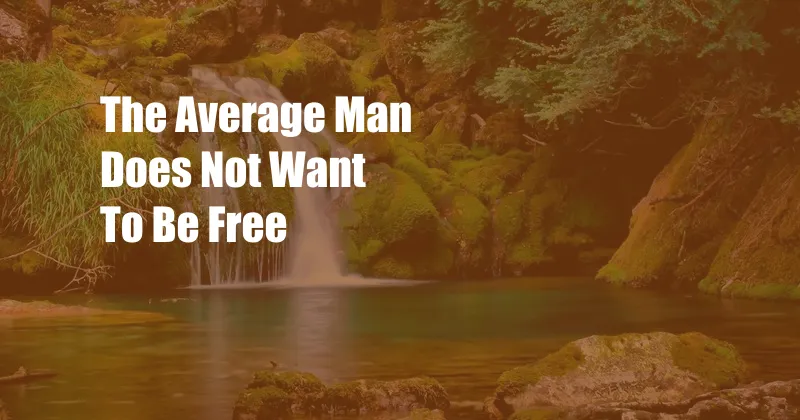
The Average Man Does Not Want to Be Free
In the annals of human history, there have been countless individuals who have fought and died for the cause of freedom. From the ancient Greeks to the American Revolutionaries, people have yearned for the ability to live their lives without the constraints of oppression and dogma. However, it is a sobering truth that the average man does not truly desire freedom in its purest form.
The idea of freedom often conjures images of boundless opportunity and personal autonomy. Yet, for many, the reality of freedom can be overwhelming and even frightening. True freedom entails not only the power to choose but also the responsibility to make choices and live with their consequences. In a world where comfort and security are highly prized, the average man often finds it easier to surrender his freedom in exchange for the perceived safety and stability of a structured and controlled environment.
The Paradox of Freedom
The paradox of freedom lies in the fact that while it is universally lauded as a desirable state, it is simultaneously feared and resisted by many. This is because freedom, in its truest sense, requires a level of self-reliance and accountability that most people are not willing to embrace. It necessitates the ability to think critically, question authority, and make decisions based on one’s own moral compass, rather than relying on the dictates of others.
Furthermore, freedom can be a lonely and isolating experience. In a world where conformity is often rewarded and individuality is often punished, those who choose to exercise their freedom may find themselves ostracized or marginalized. This can be a significant deterrent for those who prioritize social acceptance and belonging.
The Allure of Comfort and Security
In contrast to the challenges and uncertainties of freedom, comfort and security offer a tempting alternative. By willingly surrendering their freedom to external forces, such as governments or religious institutions, individuals can absolve themselves of the burden of responsibility and decision-making. They can live their lives according to prescribed norms and expectations, knowing that their basic needs will be met and their safety will be ensured.
The allure of comfort and security is particularly strong in times of crisis or uncertainty. When faced with adversity, people are more likely to seek refuge in the familiar and the predictable. They may be willing to sacrifice their freedom in exchange for the promise of stability and protection.
The Importance of True Freedom
While it is understandable that the average man may be drawn to the comforts of security, it is crucial to recognize the importance of true freedom. Freedom is not simply the absence of external constraints but the ability to live one’s life according to one’s own values and aspirations. It is the foundation of human dignity and the essential ingredient for personal growth and fulfillment.
In order to create a truly free society, it is necessary to foster a culture that values critical thinking, encourages individuality, and empowers people to make their own choices. Education, open dialogue, and the protection of civil liberties are essential elements in this endeavor. It is also important to challenge the idea that freedom is a threat to order and stability. On the contrary, a truly free society is one that is both prosperous and harmonious, as it allows for the full expression of human potential.
Tips for Embracing Freedom
Embracing freedom can be a daunting task, but it is one that is well worth pursuing. Here are a few tips to help you on your journey:
- Embrace Self-Reliance:
Develop the ability to think for yourself and make decisions based on your own values and beliefs. Do not rely on others to tell you what to do or how to live your life. - Challenge Authority:
Do not blindly accept the dictates of others, even if they are in positions of power or authority. Question everything, and seek out the truth for yourself. - Step Outside Your Comfort Zone:
True freedom often requires you to step outside of your comfort zone and take risks. Embrace new experiences and challenges, and do not be afraid to make mistakes.
Remember, freedom is not a destination but a journey. It is a constant process of learning, growing, and evolving. By embracing the principles outlined above, you can unlock the full potential of freedom and live a life that is truly your own.
FAQs on Freedom
Q: What is the difference between freedom and independence?
A: Freedom refers to the ability to live one’s life without external constraints, while independence refers to the ability to live without relying on others for financial or practical support.
Q: Is freedom a right or a privilege?
A: Freedom is a fundamental human right that should be available to all people, regardless of their circumstances.
Q: Can freedom be abused?
A: Yes, freedom can be abused if individuals use it to harm others or infringe on their rights.
Q: How can I protect my freedom?
A: You can protect your freedom by exercising your rights, such as voting and expressing your opinions, and by supporting organizations that work to promote freedom.
Conclusion
The average man may not actively seek freedom, but it is a vital ingredient for a fulfilling and meaningful life. By understanding the paradox of freedom and embracing the principles of self-reliance, critical thinking, and courage, we can create a more just and equitable society where all people are free to live their lives to the fullest.
Call to Action:
Are you interested in learning more about freedom? Explore our website for additional resources on this fascinating topic. By embracing freedom, we can unlock our true potential and create a better world for ourselves and future generations.